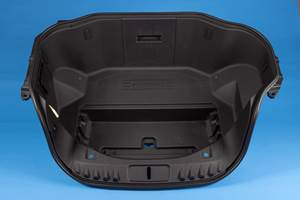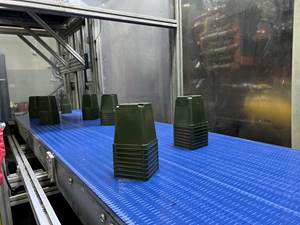Research Deems Bioplastics, Wood Pulp a Sustainable, Economic Alternative for Rigid Packaging
Farrel Pomini and FPInnovations produce biodegradable compound for molding, extrusion and thermoforming applications.
Recent research conducted by Farrel Pomini, FPInnovations and a consortium of industry leaders have reportedly demonstrated the commercial viability of biobased, compostable compounds such as polylactic acid (PLA) and polyhydroxyalkanoates (PHA) mixed with high levels of fiber in a variety of disposable packaging products, paving the way for eco-friendly products like food trays and disposable cutlery (Figure 1).
Compounding equipment builder Farrel Pomini and Montreal-based , the world’s largest nonprofit research technology organization for forestry, have proven the technology to produce industrial-grade biobased compounds with fiber content up to 60%. The compounds, produced on the Farrel Continuous Mixer, have been used to manufacture various products, including injection-molded disposable knives with up to 40% fiber, extruded sheets and thermoformed parts with fiber content ranging from 0.5% to 10%.

FIG 1 Applications for bioresin and wood pulp compounds include disposable cutlery. Source: FPInnovations
The final products are odor-free with light coloration, attributed low processing temperatures. Dr. Peng Ye, applications development manager for Farrel Pomini, presented the results of this project in May in Orlando, Florida, during NPE2024.
Leveraging Cellulose From Wood Pulp
Development of these cellulose-filled biodegradable resins is a result of a collaborative effort led by FPInnovations, based in Montreal. Farrel Pomini played a crucial role in producing these compounds at pilot and industrial scales using its continuous mixing technology at its lab in Ansonia, Connecticut.
The key to these innovations lies in using refined wood pulp, sourced for this collaboration from sawmill residue provided by West Fraser, a major wood products company. This refined wood pulp undergoes a process that removes most of the lignin, leaving cellulose and hemicellulose.
The low-lignin content of this wood pulp makes it suitable for food contact applications, and enhances processing conditions and heat resistance. Moreover, its wide commercial availability and inherent compostability make it an well suited for sustainable everyday products solutions, notes Dr. Yann Gabet, FPInnovations’ senior scientist and the project leader for the Biocomposites Initiative.
Farrel Pomini and FP Innovations found that adding cellulose fibers in PLA and PHA compounds provided several advantages, notably:
- High dispersion quality: The compounds demonstrate excellent dispersion up to 60% cellulose content.
- Enhanced heat resistance: The heat deflection temperature (HDT) of crystalline PLA-based parts significantly improves with the addition of cellulose fiber, surpassing 100°C with 5% wood pulp and reaching 150°C with 20% pulp content. This makes the compounds suitable for hot food and liquid contact applications (see Figure 2).
- Mechanical properties: Adding up to 5% wood pulp maintains or enhances tensile modulus, tensile strength and impact resistance without significantly affecting elongation properties (see Figure 3).
Ye and Gabet note that a critical feature of these cellulose-filled PLA compounds is their accelerated biodegradation compared to pure PLA. Testing conducted in accordance with ISO 14855-1 standards showed that PLA compounds with 20% cellulose demonstrated a faster biodegradation rate within the first 25 days compared to PLA alone. Additionally, compounds with 5% of another type of cellulose product achieved 90% biodegradation nearly 30 days earlier than pure PLA.

Moreover, according to Ye, Farrel Pomini’s compounding technology helps reduce the impact of the compounding process on sensitive materials (like cellulose and biopolymers) by utilizing low processing temperatures. This process also enables a reduction in moisture content from an initial 3% to 4% in the fiber to a final compound moisture of 0.05% to 0.1%.
 FIG 3 Adding up to 5% wood pulp maintains or enhances tensile modulus, tensile strength and impact resistance without significantly affecting elongation properties.
FIG 3 Adding up to 5% wood pulp maintains or enhances tensile modulus, tensile strength and impact resistance without significantly affecting elongation properties.The Farrel Continuous Mixer (FCM) is a continuous compounder well suited to processing highly filled, temperature/shear-sensitive applications and excels at processing biodegradable plastics in addition to white and black masterbatches, PVC, flooring, halogen-free flame-retardant compounds, and wire and cable applications.
The FCM melts feedstock resins and homogenizes them under specific temperature and pressure parameters. Ye explains that the mixer’s low process temperature, short residence time and efficient rotor shear make it well suited for processing temperature-sensitive materials or materials with prior heat history. The mixer has been used to process PLA, PHA, PBS, recycled PVC and film scrap.
Environmental and Economic Benefits
Incorporating cellulose fibers into biodegradable resins offers several economic and environmental advantages, the partners in this project determine. These include:
- Lower costs compared to pure biopolymer
- Improved compostability of final products
- Optimized mechanical properties
- Improved heat resistance
- Lower carbon footprint
States Gabet, “The successful development and scaling of cellulose-filled biodegradable resins highlights a significant leap towards sustainable solutions for plastic-based everyday products. By combining innovative technology with the abundant resource of wood pulp, these advancements offer a practical and environmentally friendly alternative for various applications.”
Related Content
New Screw Boosts Mixing, Enhances Polymer Properties
Device mixes at the ‘molecular level,’ inventor says, to boost mechanicals and in some cases make pre-drying redundant.
Read MoreAutomotive Awards Highlight ‘Firsts,’ Emerging Technologies
Annual SPE event recognizes sustainability as a major theme.
Read MoreFor Extrusion and Injection-Blow Molders, Numerous Upgrades in Machines and Services
Uniloy is revising its machinery lines across the board and strengthening after-sales services in tooling maintenance, spare parts and tech service.
Read MoreProcessor Turns to AI to Help Keep Machines Humming
At captive processor McConkey, a new generation of artificial intelligence models, highlighted by ChatGPT, is helping it wade through the shortage of skilled labor and keep its production lines churning out good parts.
Read MoreRead Next
Lead the Conversation, Change the Conversation
Coverage of single-use plastics can be both misleading and demoralizing. Here are 10 tips for changing the perception of the plastics industry at your company and in your community.
Read MoreSee Recyclers Close the Loop on Trade Show Production Scrap at NPE2024
A collaboration between show organizer PLASTICS, recycler CPR and size reduction experts WEIMA and Conair recovered and recycled all production scrap at NPE2024.
Read MoreBeyond Prototypes: 8 Ways the Plastics Industry Is Using 3D Printing
Plastics processors are finding applications for 3D printing around the plant and across the supply chain. Here are 8 examples to look for at NPE2024.
Read More












